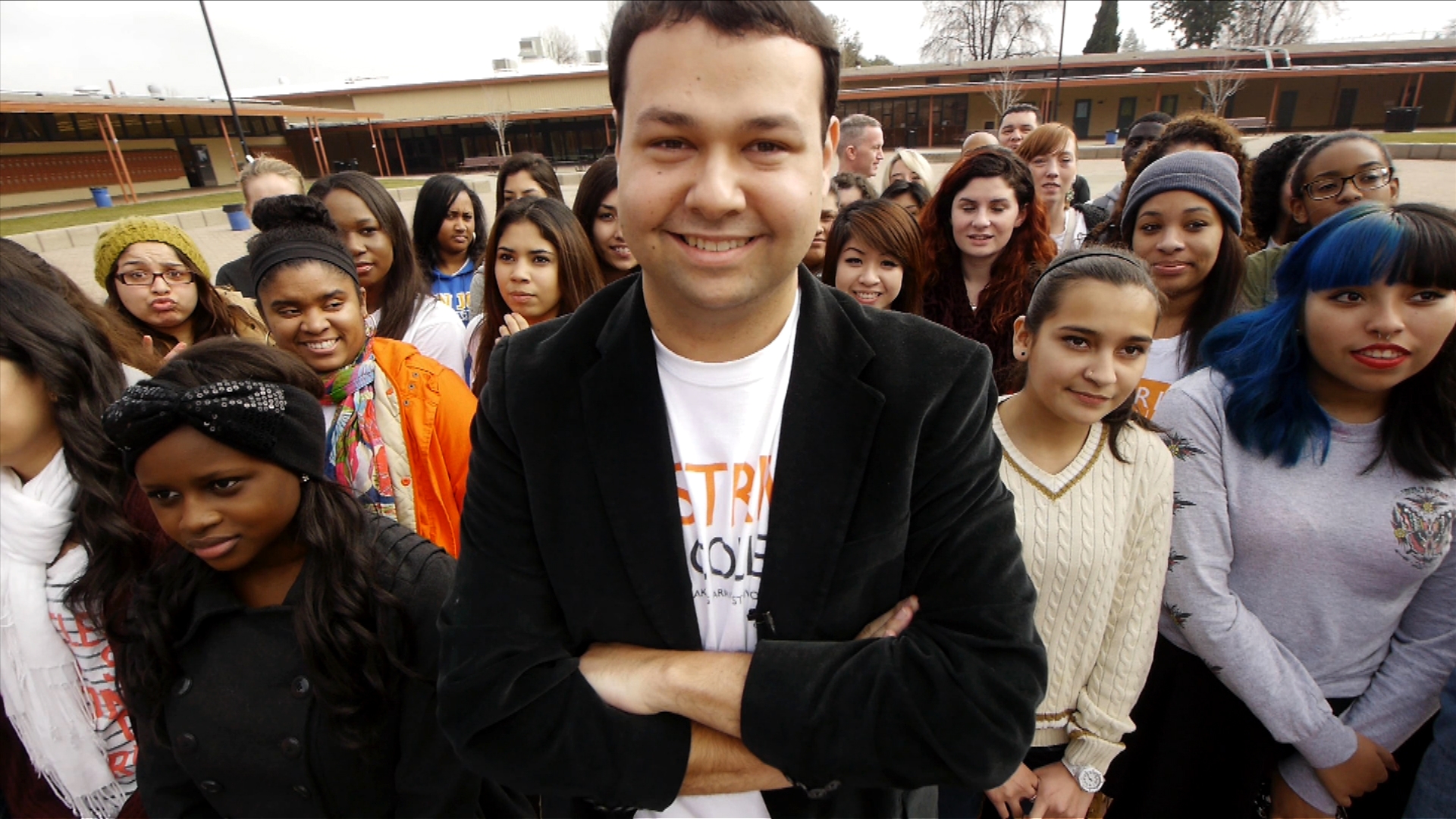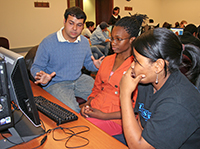Manuela Araque remembers applying for college like it was yesterday because, well, it almost was.
Araque is a freshman in Arts & Sciences at Washington University in St. Louis. She is also a mentor for Strive for College, a leading national organization that helps low-income students navigate the college application process. Founded at Washington University in 2007, Strive for College has recruited students from 100 colleges nationwide and has helped 2,000 students enroll in four-year colleges.
“The deadlines, the tests, the essays — it was a lot to manage,” said Araque, who applied to 11 schools. “But I survived, and now I feel like I can help Stephanie with the process.”
Stephanie is Stephanie Briggs, a high school senior at Cleveland Junior Naval Academy in St. Louis. Briggs wants to study chemical engineering and has applied at Washington University, University of Missouri-Columbia and Purdue University.
Every two weeks, she and Araque join 50 Strive for College mentors and their mentees at Seigle Hall on the Danforth Campus for tutoring, test prep, financial aid and scholarship advising and, sometimes, a little gossip.
“I love hearing her stories,” said Araque, giving Briggs a sly glance which Briggs returns with a laugh. “Sometimes we take a break and just talk about our lives.”
Briggs joined Strive for College as a high school freshman. She said the program prepared her for the ACT, helped her discover schools that are a good financial and academic fit, and taught her to better manage her time.
“I was the sort of student who would wait until Sunday to do my homework, but now I am much more organized,” Briggs said. “It’s easy to let things get away from you, but you have to stay focused.”
Battling misconceptions
Today, Strive for College founder Michael Carter is one of the nation’s leading advocates for college accessibility. But he got his start at Washington Univeristy as an Annika Rodriguez Scholar.
 Washington University graduate Michael Carter, founder of Strive for College, with high school students. (Credit: Photo courtesy of CNN)
Washington University graduate Michael Carter, founder of Strive for College, with high school students. (Credit: Photo courtesy of CNN)
As a teenager, Carter assumed all hard-working students had a shot at college. His grandparents, Mexican immigrants who worked two jobs each to send Carter’s mother to DePaul University, knew better.
“My grandfather called me a menso, which in Spanish means ‘moron,’” Carter said. “It wasn’t until I transferred to a public high school that I saw that he was right. I had friends with really good grades who weren’t preparing for college. It didn’t occur to them that they could go.”
Carter, on the other hand, applied to 24 universities; he got into 23 and began his studies at Washington University in 2006. Carter said he loved applying to colleges.
“And this was before everything went online,” Carter said. “I had a rolling file cabinet where I kept everything. My dad said, ‘You are such a geek!’ ”
Carter chose Washington University after meeting Julia Macias, associate director of student involvement and leadership and director of the Annika Rodriguez Scholars Program. The program’s commitment to diversity and service aligned with Carter’s own values. Even before arriving, Carter asked Macias if the scholars could start a college mentoring program at a local high school. Macias embraced the concept.
“Our students are really passionate about the idea of access to college and how that can address some of the racial and socio-economic disparities in our community,” Macias said. “There a lot of places where you can get information about how to write an essay, but that one-on-one interaction with someone who just went through process seemed like a really unique approach.”
Fellow Rodriguez Scholars Diana Barbosa, who graduated in 2009, and Stephanie Wong, who graduated in 2010, helped Carter launch Strive for College’s precursor at Eskridge High School in the unaccredited Wellston School District. Wellston has since been absorbed by the Normandy School District, which also struggles academically.

“When we first came in, the students were like, ‘Who are these people?’ But we were able to build bonds because we were only a year or two older,” Carter said. “Most of the students weren’t looking at college at all, and those who were weren’t looking at four-year colleges.
“They had a lot of misconceptions. We explained that the sticker price was not the actual price and that there are all sorts of ways to pull the money together,” Carter said. “The fact that many of us had done it ourselves made it seem possible.”
The program was an immediate success; 24 out of 27 Eskridge seniors were accepted to a four-year college. The prior year, only one of the school’s 30 seniors went to a four-year college.
But Carter wasn’t satisfied. He learned that every year, some 400,000 qualified low-income students don’t enroll in college. The unfulfilled dreams, the lost wages — to Carter it all seemed a terrible tragedy for both the students who had earned the right to a college degree and the national economy.
“I got obsessed,” Carter said. “If you were my friend, you either got involved or stopped talking to me.”
While still an undergraduate studying history, Carter started to solicit investors so he could expand the program to other universities. This was in 2008, the height of the recession.
“Undermatched wasn’t even a term used then, and college accessibility was not the issue it is today,” Carter said. “Today, this idea of near-peer mentoring makes a lot of sense. But back then, there were a lot of people who didn’t think college students were qualified for this sort of mentoring.”
Still, he managed to raise enough money to launch new chapters and, after earning his bachelor’s degree in 2010, he opened the Strive for College headquarters in his home state of California. In 2013, Carter was named a “CNN Hero,” and this year, Forbes profiled Carter in its “30 Under 30: Education” list.
Strive for College continues to grow. It recently unveiled UStrive, a virtual mentoring platform that connects college students with high school students “virtually” anytime, anywhere, online. Through video conferencing, document sharing, text and instant messaging, mentors help students edit essays, decipher financial-aid forms and find scholarships. Nearly 70 Washington University students have registered to serve as Strive for College virtual mentors.
The result is participants, whether mentored online or in person, find the school that is best for them. Strive for College software provides each student with the names of reach, match and safety universities. It also breaks down graduation rates by race, gender and course of study and predicts how much a student can expect to pay for a degree after financial aid.
“As a kid who went on tons of visits, the one question I never asked was the graduation rate,” Carter said. “A lot of students take out loans to go to school with low graduation rates. They end up with no degree and a lot of debt.”

Carter reports that 68 percent of Strive for College students enroll with no debt; the remaining share pay about $7,000 a year. And nearly 90 percent remain enrolled through their sophomore year, a key graduation predictor.
“This works because of what I call ‘the Mom factor,’ ” Carter said. “In addition to mentoring, the volunteers also are nagging. There is a lot of minutiae that goes into this process, and you won’t be considered if you don’t meet all of your deadlines.”
Helping students discover their path
The Washington University chapter of Strive for College goes one step further, helping high school underclassmen select the right classes today to be prepared for college tomorrow. Strive for College participants all have graduated from either City Academy, a private elementary school that serves low-income students, or KIPP Inspire Academy, a charter middle school sponsored by Washington University.
“There is the misconception that if they just get a good SAT grade, or do one thing well, then that’s fine,” said Yaala Muller, a sophomore in Arts & Sciences and the chapter’s executive director. “By working with younger students, we can take a more holistic process. We stress that it’s not enough to have great grades. It’s also important to be involved in extracurriculars, to show commitment and to be able to write about yourself.”
On Monday, Feb. 16, local Strive for College participants will spend the day at Washington University, shadowing their mentors in class and around campus.
Jacob Metz, a sophomore in Arts & Sciences and chapter external director, hopes the experience will make the prospect of college more real. Strive for College is the signature program for Rodriguez Scholars and Metz, like Muller, Araque and many other volunteers, is a Rodriguez Scholar.
“We want students to see that college is not just one more pit stop, but an incredible experience that will change you as a person,” Metz said. “The hope is to get them to start asking the question, ‘How do I find a school that gives me the resources I need in my field but is also a place where I can contribute?’
“By sharing our own recent stories and building these friendships over time, we can really help them discover that path.”